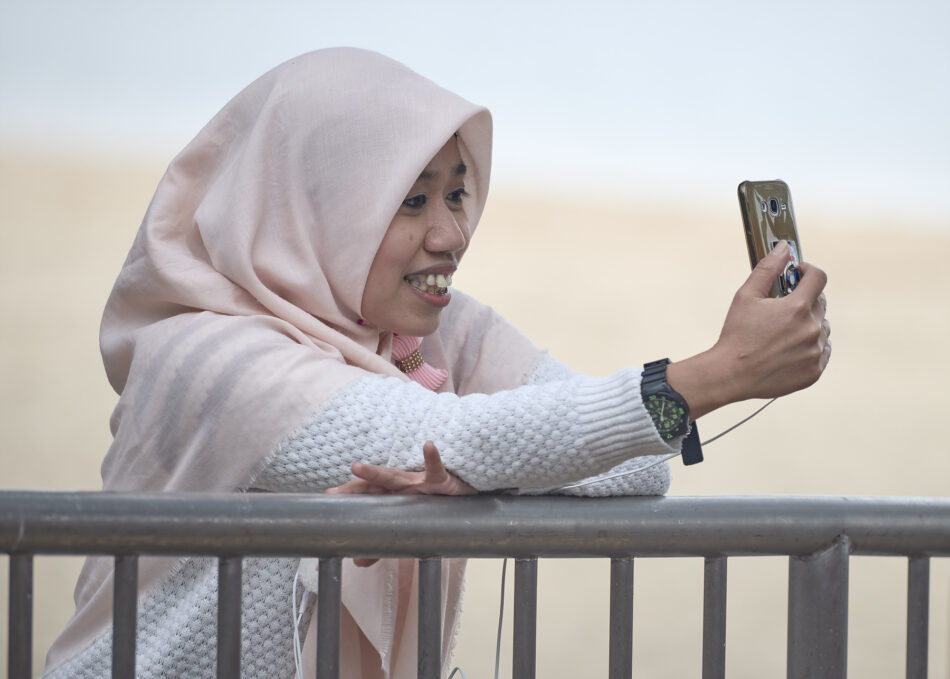Global Lens Reflections on life, the universe, and everything
Domestic work is work
Taking the side of Hong Kong’s migrant domestic workers
By Paul Jeffrey
Published in response magazine in March 2019
Fitriani lived with her grandmother as a child, because both her parents left their home in Surabaya, Indonesia, to get better-paying work abroad. They would come home once a year to visit, then leave again. Fitriani felt abandoned.
“My friends had mothers and fathers, but I felt alone. My parents always bought me things when they came home, but I didn’t want things. I wanted them,” said Fitriani, who like many Indonesians only uses one name.
When she turned 18, Fitriani followed in their footsteps and went to an agency to apply for work abroad. Her mother urged her to go to college, but Fitriani wanted to earn money first. In 2014, she got a job as a domestic worker in Hong Kong.
Her first employer treated her fairly, but after two years moved to Singapore. Fitriani asked for another contract, and she was sent to work for a woman who seemed constantly angry.
“She was fighting always with sir, so she angry a lot at me,” said Fitriani, who also goes by her nickname Fifi.
“She always deduct things from my salary. If food was the wrong color, she deduct 100 (Hong Kong) dollars. She deduct 300 dollars when I buy the wrong kind of fishball. She gave me one hour to go to market and if I take longer she deduct 500 dollars. She called me a dog, a bitch, and all sorts of bad names in Chinese. She said I could call the Labor Department and complain but that no one would believe me. She said she had money and I didn’t.”
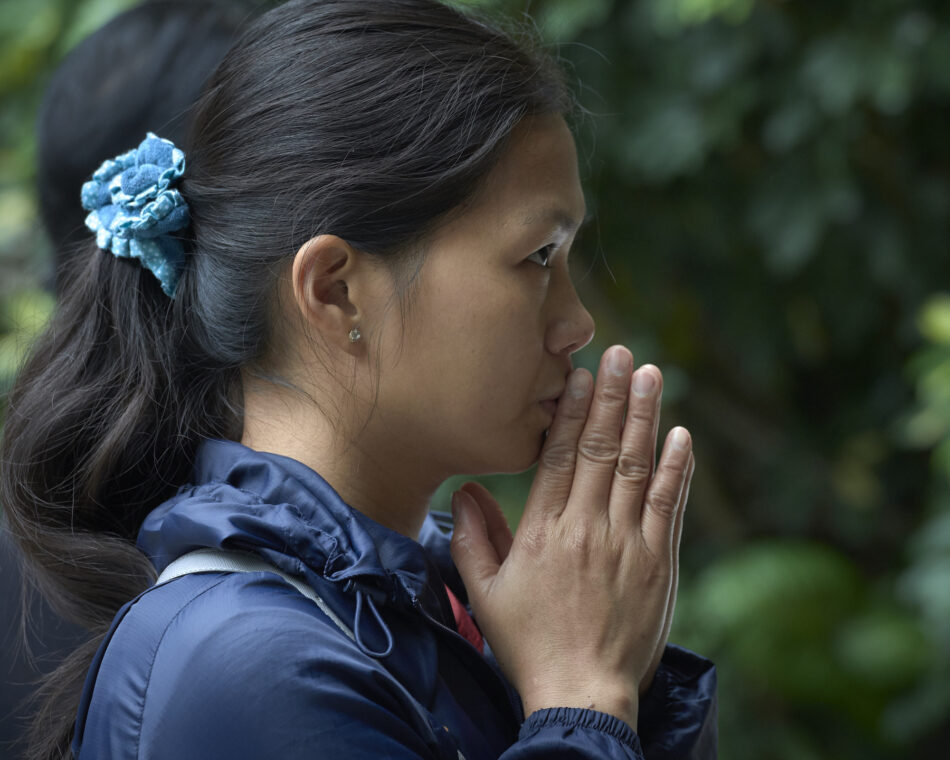
It soon escalated to physical abuse. After five months on the job, her employer slapped Fitriani. Soon the slap became a fist to the head. Then one day she dragged Fitriani by the hair and slammed her head into a door three times.
“She told me to stop crying or she would kill me,” Fitriani said.
She finally called two friends, Filipina domestic workers in the same apartment building. They took her to the building’s security office, which called an ambulance that took her to the hospital. The police picked her up and took her to the station for a statement, then dropped her off at Bethune House, a shelter in Hong Kong supported by United Methodist Women.
After months of living in Bethune House, the assault charge against her employer came to trial but was dismissed for lack of evidence. Fitriani then filed a claim for back wages against her employer, and remained living in Bethune House while her claim was being considered.
Bethune House runs two shelters in Hong Kong where domestic workers with problems of many kinds can live for free until their cases are resolved. If they didn’t have Bethune House, most would have to leave the country and thus lose their cases by default.
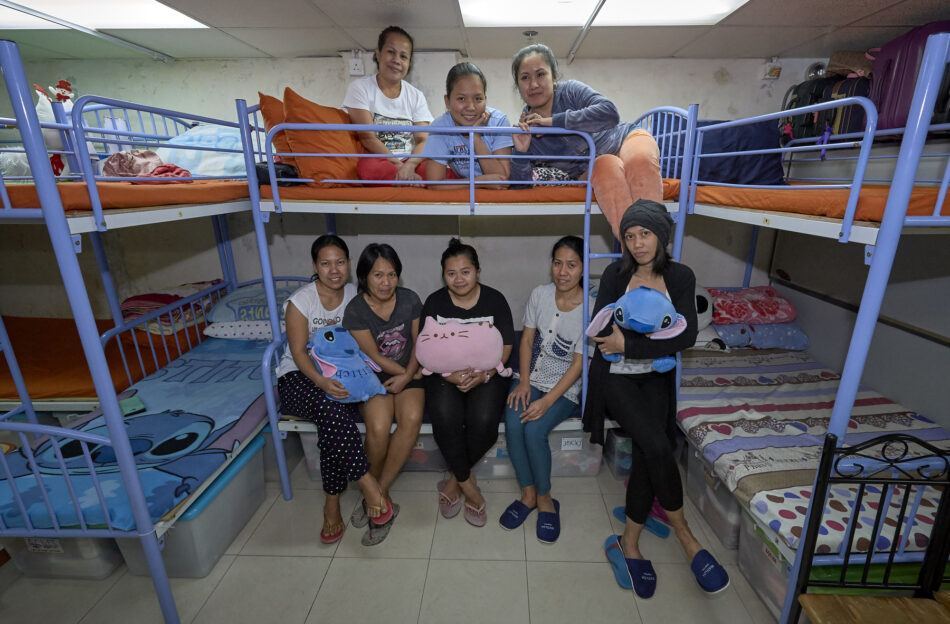
“I have learned many things while here, including English. I’m happy here, everyone is my ‘Ate,’” she said, using an affectionate Filipino term (pronounced ah-tay) for older sister or aunt.
“When I hear the Ates phoning their families, and asking their children back home if they have eaten their dinner, I remember my mother asking me the same question over the phone years ago. I can’t call my parents from here, because I can’t stop crying.”
“A kind of modern slavery”
Bethune House is one of several church-sponsored programs in Hong Kong that assist migrant domestic workers when they have problems.
And problems abound. There are some 370,000 foreign domestic workers in Hong Kong, roughly 5 percent of the population. Almost all of them are from the Philippines or Indonesia, and their numbers have increased steadily in recent years as more and more middle-class families hire domestic workers, freeing up additional family members to work outside the home. That provides additional income, but it means domestic workers are increasingly working and living in smaller middle-class apartments in a crowded city famous for its tiny living spaces.
“They don’t like us but they need us anyway. They couldn’t work outside the house if they didn’t have us. They wouldn’t survive without us,” said Muthi, an Indonesian domestic worker and activist. “Many of my friends don’t have enough food, and at the beginning of a contract the agency deducts most of your salary. For many, their work here in Hong Kong is a kind of modern slavery.”
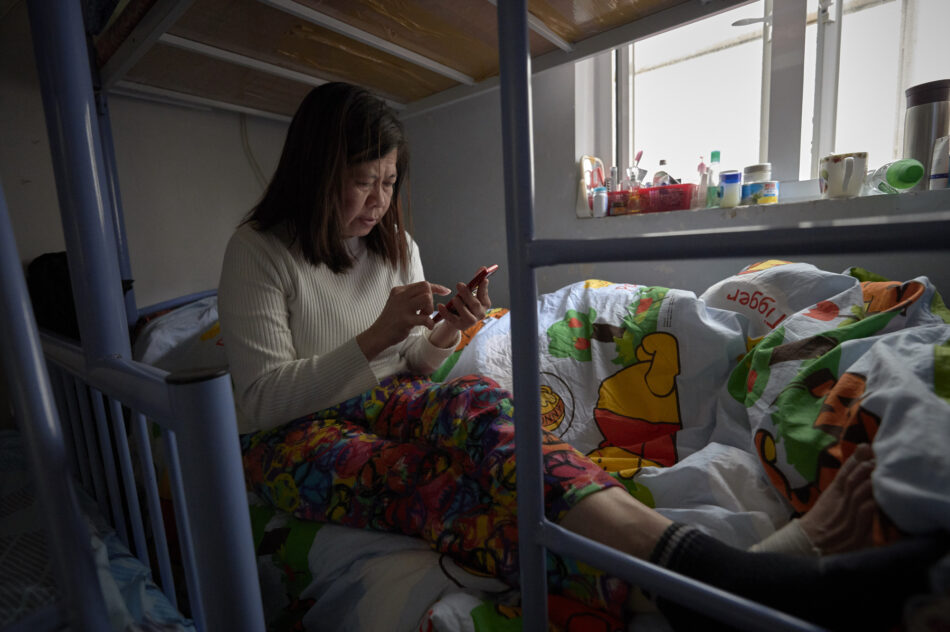
By most accounts, a majority of employers treat their workers appropriately, though the legal framework for domestic workers recognizes few employee rights. The Chinese and Hong Kong governments have refused to sign Convention 189, an international agreement guaranteeing protection to domestic workers. So it’s up to the workers themselves, and the organizations that support them, to fight for respect and, in many cases, survival.
One of the common complaints of migrant domestic workers in Hong Kong is that there are no set hours and they are legally required to live at their work site. “As a result, migrant workers are mostly on 24-hour call, and most work 16 to 18 hours a day with little rest. There is a lot of abuse,” said Loryjean Yungco, a Filipina domestic worker and labor activist. “We are pushing for the ratification of Convention 189. The government doesn’t want to accept that, but we insist that we are workers not slaves, and that the government should recognize that domestic work is work.”
According to Cynthia Abdon-Tellez, the general manager of the Mission for Migrant Workers, the requirement to “live-in” is a great source of stress. No other workers in Hong Kong are required to live in their job site, but more than a decade ago the government made it a crime for employers to arrange for migrant domestic workers to sleep elsewhere. As a result, they are often forced to sleep in a hallway, bathroom, cupboard or outside balcony.
“We listen to many of the women complain about their physical ailments and how they are growing old, but we ask them where they sleep and they often tell us that for years they’ve been sleeping in a cupboard that’s shorter than they are. No wonder they have back pain,” said Abdon-Tellez.
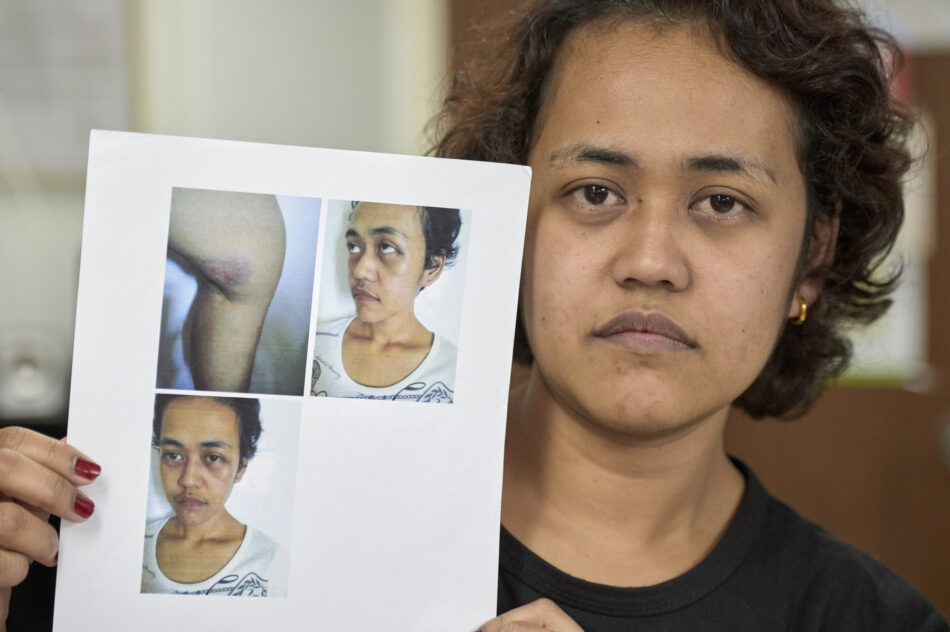
The Mission, which also receives financial support from United Methodist Women, commissioned a survey in 2017 about the living conditions of more than 3,000 domestic workers. Some 42 percent reported they do not have their own room, which many said increased their vulnerability to sexual abuse. And among those who did have a separate room of their own, more than half said the room was also used for storage, laundry, or some other purpose.
The survey, which was published with photos of several migrant domestic worker sleeping spaces, called on the government of Hong Kong to ratify Convention 189 and to implement a series of legal and regulatory steps to guarantee suitable accommodation for the workers.
Permanent temporariness
Another common complaint of migrant domestic workers is what Abdon-Tellez dubs the “permanent temporariness” of the women in the Asian city. While other foreign workers can petition for residency after a certain number of years, domestic workers are barred.
Eman Villanueva, a Filipino, is one of very few male domestic workers in Hong Kong, “I have been here for 26 years and I am still just a contractual worker. If I come into Hong Kong as a professional, like a teacher or engineer, after seven years I can apply for residency. But that’s not the case for migrant domestic workers,” he said.
“Most of us, probably all of us, have families that stay behind in the Philippines. We cannot bring them here. We can only bring them here to work. And that’s actually what’s happening to some migrants here. Their children grow up to follow them here because there’s no job back in the Philippines. So they also come to be domestic workers here.”
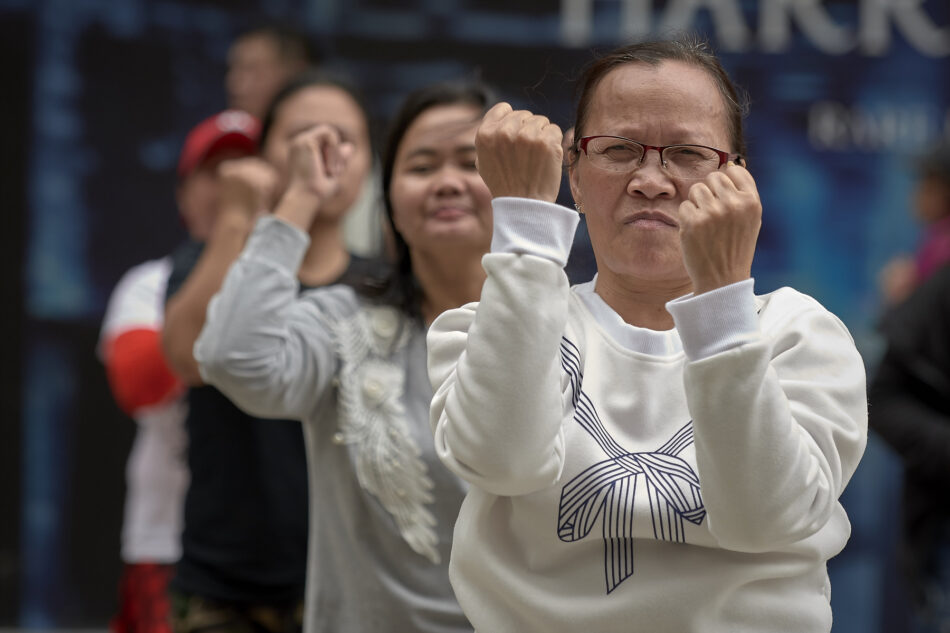
According to Ma Wan Ki, a Hong Kong political activist who often collaborates with migrant organizations, a change in the legal status of migrant domestic workers is unlikely.
“A few years ago the migrant workers were fighting for the right to residency in Hong Kong. It was a huge issue, and 90 percent of the population was against it,” he said. “People are afraid that if the workers are granted the right to apply for residency, many of them would bring their children and husbands and parents and would invade Hong Kong. They worry that resources like schools and hospitals would be overrun, that they would get less attention. So that’s why many of them turn against domestic workers. Many Hong Kong people that see them as second-class citizens who are here just to work and nothing else. They should not enjoy their lives here, where they get a higher salary than back home. So who are they to ask for more?”
In Hong Kong as elsewhere, anti-migrant politicians claim the foreign workers are siphoning off scarce resources to send home to their native countries. But Abdon-Tellez says that the Mission is currently finishing a research project that belies that claim.
“Our studies show that 60 percent of the workers’ salaries are spent here. It’s not true that they’re siphoning off money. They spend on their own needs and purchase local products, and buy things here that they send back home,” she said.
When migrant domestic workers suffer from physical or sexual abuse, or are unjustly terminated or mistreated, Hong Kong authorities aren’t always helpful, says Ma Wan Ki.
“Many police are lazy or they don’t speak English, and some of them will try to fool the women, telling them to go away, that they have no case and should go home. Or they say it’s outside their authority and they can’t do anything about it. Some of them will even scold the worker, but if the worker is consistent and persistent enough, she will eventually get help,” he said.
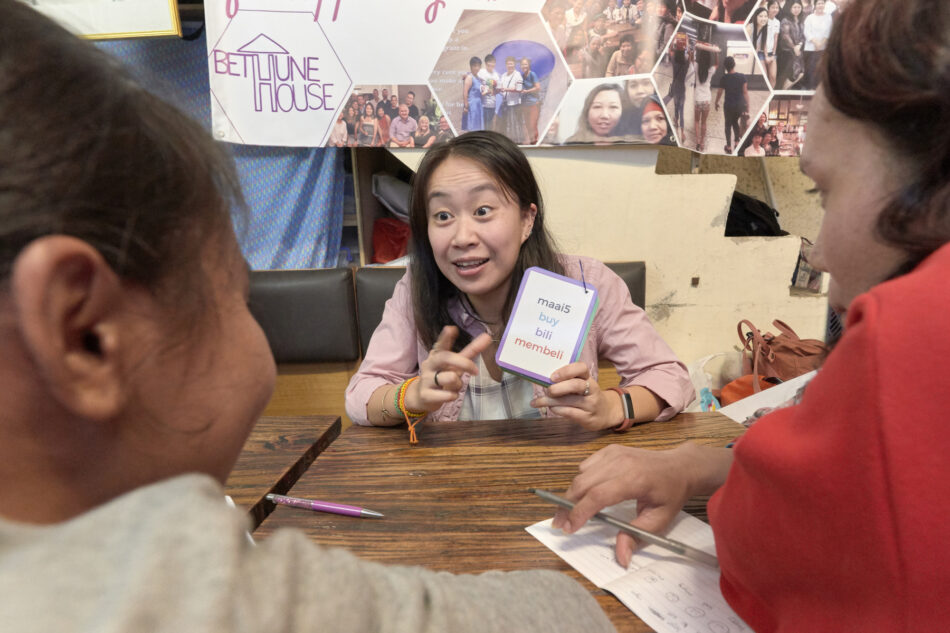
It’s precisely that gap between the needs of the worker and the inadequacy of the local response where the Mission and Bethune House play a critical role. The Mission helps counsel women with legal problems, at times providing them with attorneys, and often refers them to Bethune House so they have a place to stay while their cases work their way through the legal system.
Women who lose their employment have only two weeks to sign a new contract or they will be sent home. Yet immigration authorities won’t let them work if they have cases in the courts. “That’s why shelters are needed,” said Edwina Antonio-Santoyo, the executive director of Bethune House. “They paid a lot of money to come work in Hong Kong, and they will only willingly terminate their contract if the conditions are unbearable. But if their contract is arbitrarily terminated by the employer without cause, the worker needs somewhere to stay in order to get justice. They are prohibited from fending for themselves. They need shelter and food and other assistance in order to fight for their legal rights.”
“We would look for buildings with crosses on top”
Abdon-Tellez first came from the Philippines in 1981 to do a study for the National Council of Churches of the Philippines, which was growing concerned about the living conditions of what were then some 9,000 Filipina workers in Hong Kong. (Today there are 20 times that number of Filipina domestic workers there.)
She wanted to listen to the workers, but first she had to find them. Since they worked six days of the week, she could only find them on Sundays, their one day off. And churches provided the best place to look.
“Filipinos come together easily, and you could find Filipinos who sang in the church choirs, or served communion, or participated in the Bible study groups. So on Sundays we would look for buildings with crosses on top. It didn’t matter if it was Catholic or Protestant. We would introduce ourselves to the pastor or priest and ask if we could talk to their people, because we had heard they had many Filipinos. And they let us speak before the Mass or during the coffee time,” she said.
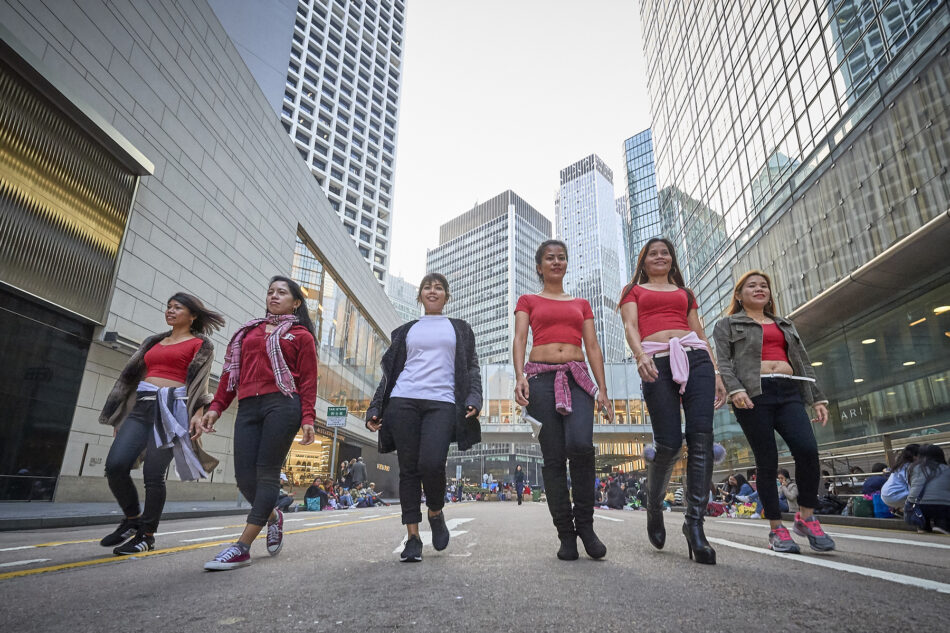
As they got to know the migrant domestic workers, they heard countless stories of abuse. So with the help of the Hong Kong Christian Council, they arranged meetings with local labor law specialists who gave them a crash course in dealing with grievances. Those meetings became a regular event, with participation from representatives of most of the organizations that the migrant workers had already formed themselves–each group often made up of workers from a particular province back in the Philippines.
It was difficult to organize domestic workers in those days. Locked in their employers’ house or apartment for most of the day, contact with each other was challenging. Everything had to take place on Sunday, when the women took advantage of their one day off to meet with their peers at central locations around the city.
“When we started our work, the women were sending letters to and from their families and they didn’t have many connections outside. So Sundays were a time when they could be boisterous and talk at the top of their voices. And then the tape recorder came along and women starting sending and receiving cassette tapes from their families back home. On Sundays you would find women sitting listening to those tapes,” Abdon-Tellez said.
Cell phone technology has changed all that. The women use social media to communicate with their families back home and with each other. The ease of communication today makes organizing much easier. “Not surprisingly, some employers confiscate the phones and only give them to the worker on Sunday. They can complain about that, but they don’t want to lose their job so they won’t complain very hard,” said Abdon-Tellez.
If they can keep their phones, the women use WhatsApp and Viber to communicate with each other. This has changed the way the Mission does its work. Where its staff once had to struggle to communicate with women behind their employers’ walls, now Abdon-Tellez says she and her staff use text messaging to quickly respond to most appeals for help.
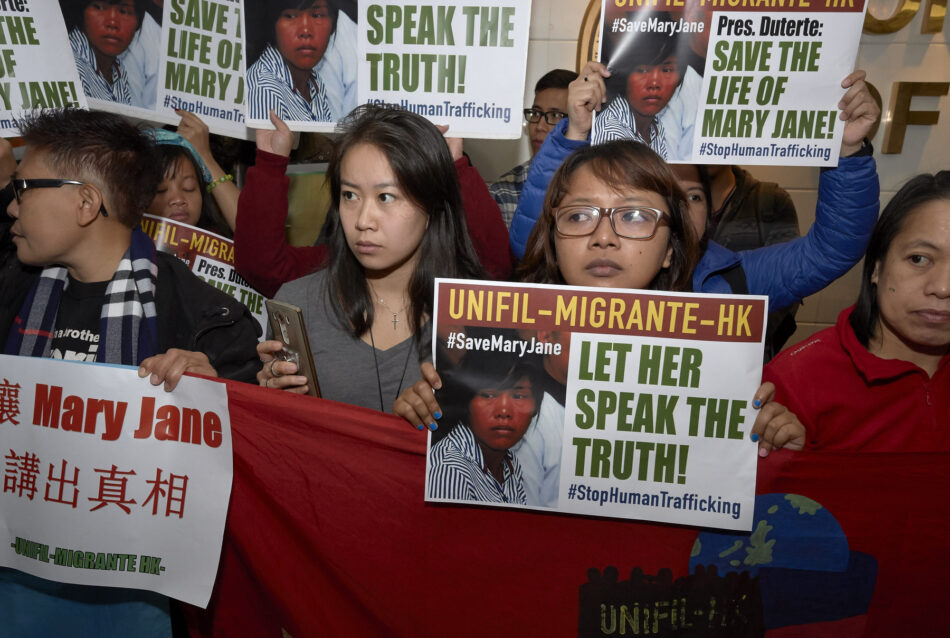
It’s that ability to communicate that has helped the migrant domestic worker community in Hong Kong to exercise its political capital, taking to the streets in demonstrations when necessary to protest unfair local policies as well as onerous regulations in their countries of origin. When the Hong Kong government wanted to cut the salaries of domestic workers during a financial crisis, for example, street demonstrations persuaded it to back off. When the Philippines government under Ferdinand Marcos required workers to remit half their salaries through banks owned by his cronies, the workers–and their families back in the Philippines–protested until the requirement was dropped.
In all these cases, it’s the workers themselves who decide what is important and when and where to make their voices heard. The staff of the Mission for Migrant Workers sees its ministry as solidarity–providing education and legal assistance, referring women when needed to the shelter run by Bethune House.
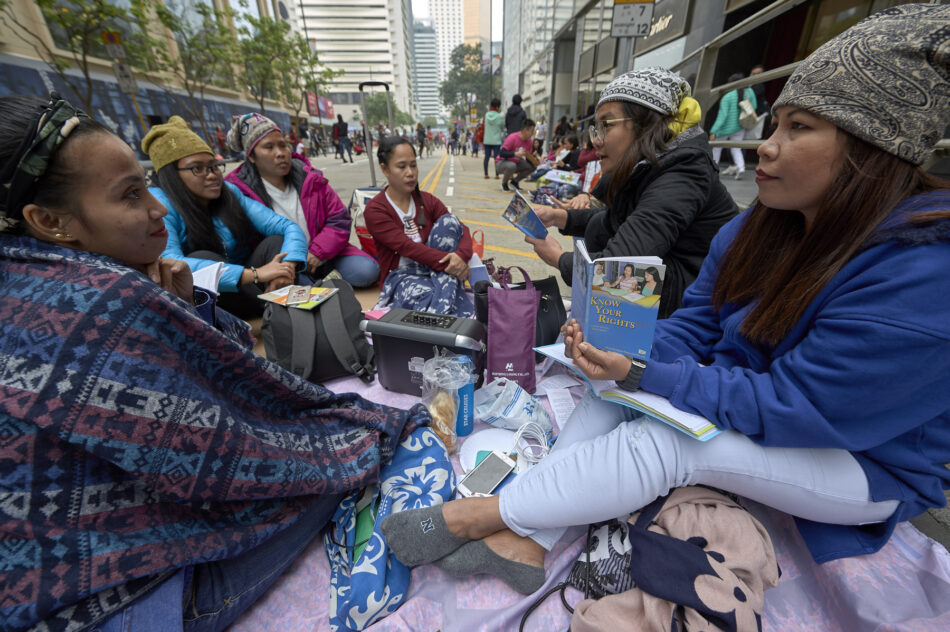
The Mission’s educational work has focused on helping workers know their rights. The Mission published a book, “Know Your Rights,” which workers’ organizations use as a basic textbook for consciousness-raising, often sitting in circles on Sunday afternoons, studying the book together.
As the numbers of migrant domestic workers has steadily grown, the Mission has trained what it calls “movers”–workers who function as counselors within the domestic workers’ own organizations, providing legal advice in uncomplicated cases.
“The Mission has set up welfare committees within the organizations, and people are being trained to attend to simple cases where they can give advice. If it’s really an urgent case and they cannot handle it, then they will bring it to the Mission. We train them in essence to be paralegals,” said Antonio-Santoyo.
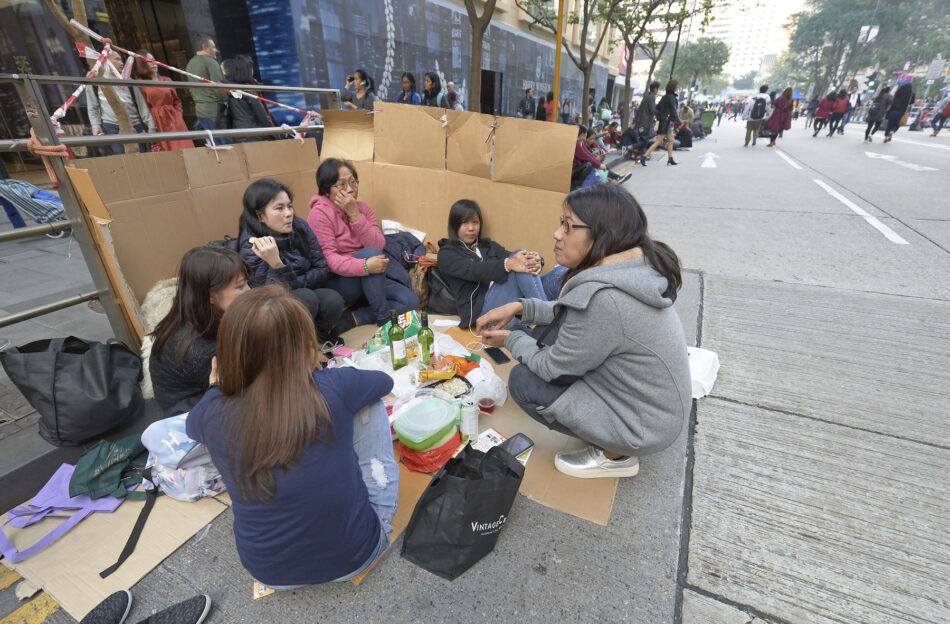
As a result, there’s less face-to-face casework for Mission staff as the workers’ organizations take on most of their own grievances. Antonio-Santoyo says they’re collaborating with some 300 Filipina and Indonesian organizations, and they’re expanding the paralegal training to Thai and Sri Lankan workers groups.
The culture around violations of workers’ rights has changed, Antonio-Santoyo says.
“Today migrant workers know what to do when they are faced with problems. They know that they need to go to the immigration department to inform about the situation so that it can be recorded, and so if something happens to them then immigration already knows that this domestic worker is not treated well by the employer. They know they need to write diaries, documenting their cases so that if they are kicked out from the home then they have records with them. Ten or 15 years ago it was different. Now they record things, now they write, now they join an organization. It could be a union or a sports organization or a dance group or even a beauty pageant, but still they are part of that organization and so can easily network with other organizations,” she said.
Happy Homes
At times the conflicts between migrant domestic workers and their employers grow out of misunderstandings about work or a lack of appropriate training for the employee. Many of the workers get a day or two of cursory training, provided by the employment agency that arranged their contract, but workers say what they learn often isn’t what their Hong Kong employers expect. Add to that differing cultural practices around childrearing, for example, and you’ve got a recipe for stressful relationships.
The Mission has begun training sessions to help domestic workers upgrade their skills, thus improving their workplace performance and lowering stress. One particular skill in growing demand is elder care, given Hong Kong’s rapidly aging population. Workers untrained in moving elderly clients can easily hurt both themselves and their clients, so with support from United Methodist Women the Mission is providing training to cut down on the number of debilitating accidents.
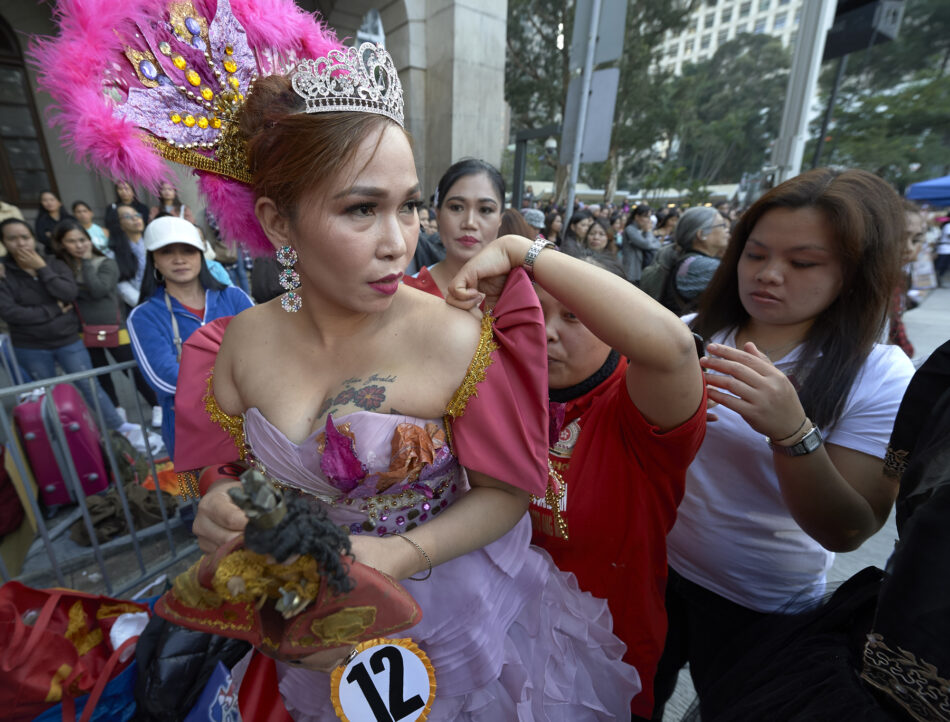
The Mission has also decided to take a more proactive approach to encouraging healthy workplaces for migrants, asking domestic workers to nominate employers they appreciate for a “Happy Homes” award.
Workers can nominate their employers, and if the employers agree, they are interviewed over the phone by Mission staff, which runs through a checklist with them. If they pass, they are awarded the Happy Homes seal of approval and honored on the Mission’s Facebook page and in a periodic ceremony. Abdon-Tellez says the ceremonies have turned into fun, family affairs. Yet she says three employers refused to accept the award, claiming that they were just doing their duty and shouldn’t be awarded for acting decently.
“Our work isn’t just about dealing with abuses. There’s another side to this work. There are many good-hearted people in Hong Kong, otherwise I would not have stayed here for more than 30 years,” said Abdon-Tellez.
“We hope this helps to bridge the gap between domestic workers and the government and the local community. And it’s a step towards everyone realizing that migrant workers are an integral part of Hong Kong and should be respected and have the dignity protected. There are more than 350,000 migrant domestic workers here. That means that 350,000 families are released from housework in order to go out and develop their businesses and earn more for their families, just because there is someone in the household every day caring for their children and elderly and cooking everything.”
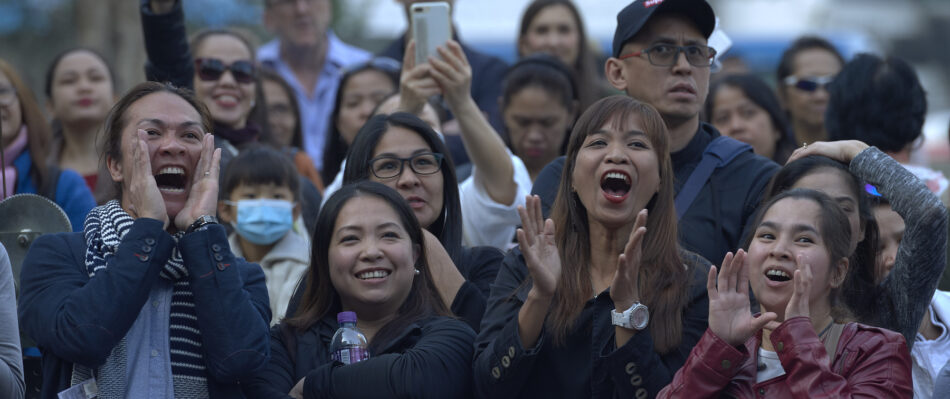
At the same time, the Mission launched a dedicated phone line for employers to call with questions.
“Many times employers are dependent on what the labor agencies tell them. That information may be partial or simply wrong. We say we will try our best to give you the correct information, and if they have a problem with their domestic worker we will try to help. That doesn’t avoid the fact that we are biased in favor of domestic workers, but we know that there are some situations that we can help people address,” said Antonio-Santoyo.
“You depend on others”
Eni Lestari is an Indonesian domestic worker in Hong Kong who also chairs the International Migrants Alliance. She says migrants need organizations to which they can belong.
“When you work as a migrant in a place like Hong Kong, you are often alone and don’t know the law of the country. So you depend on others to help you understand your rights and what resources you have available. Joining a union provides you access to information, and when you need help with something like paperwork at the consulate, the union can help,” she said.
“The union also helps transform voiceless and disempowered women migrants into more empowered activists. You’re transformed both as a migrant and as a woman. Because you’ll discover your own strength and that of your sisters. Without that, many women workers think they have no rights, and the quality of their life depends on the kindness of their employer or agency. And they’re supposed to slavishly follow their wishes. Because of the culture we Indonesians come from, it’s easy to fall into a slave mindset, where we think we don’t have any rights. It’s important to convince ourselves that we have rights and can exercise them.”
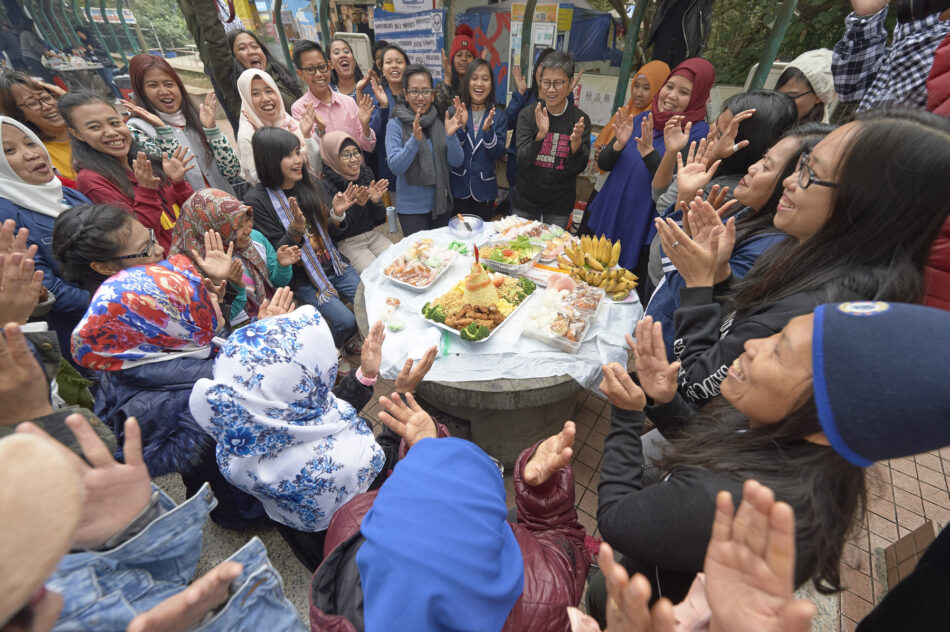
Lestari says unity amplifies the voice of the workers.
“If the government only sees one or two persons advocating for something, it will not work. If the workers can combine their numbers and their voices, then it makes a difference. And when we combine the voices of different nationalities of workers, the government will usually think twice before it even says something about us.”
Lestari praised the work of the Mission for Migrant Workers and Bethune House.
“Contrary to many NGOs, the Mission believes in the empowerment of migrants. So they always tell their clients that they better get themselves organized, you better form your own unions, and if you need this or that let us know and we will help you. They don’t want us to be clients forever,” she said.
“They also know there are things we cannot do that they have to do. Providing a shelter, for example, is an expensive operation. We cannot do that, but it’s essential that people who run away or need a safe place have somewhere they can go. And they have to do the advocacy work, because they have access to resources and connections we don’t have. So it’s very clear that this is a partnership. The Mission has been a partner to us, helping us to know our rights and become advocates for ourselves. But they don’t tell us what to do.”
Rey Asis is program coordinator for the Asia Pacific Mission for Migrants, a regional umbrella group that includes the Mission and Bethune House. He says churches have worked hard to overcome paternalism in their relations with migrant workers.
“Our mantra has always been the empowerment of migrant workers. We don’t see ourselves as messiahs, as solvers of their problems. We can never speak on behalf of migrants. We encourage migrants to organize themselves. For years, many spoke on their behalf, but now they’ve decided they need to speak for themselves,” he said.
“The system is rigged against the poor. Ultimately, the migrants only have themselves to rely on, but they need sympathetic institutions that will accompany them and provide them with a safe space where they can talk, organize, celebrate birthday parties, conduct workshops, where they can talk about issues from their relations with families back home to policies and legislation that will affect them in the country where they work. In the international discussion about immigration, there’s very little space for the migrants themselves to speak. One of the ways that churches and other faith-based groups can help is simply to provide them a safe space to work on their own struggles.”
The Rev. Paul Jeffrey is a United Methodist missionary and senior correspondent for response. He lives in Oregon.
